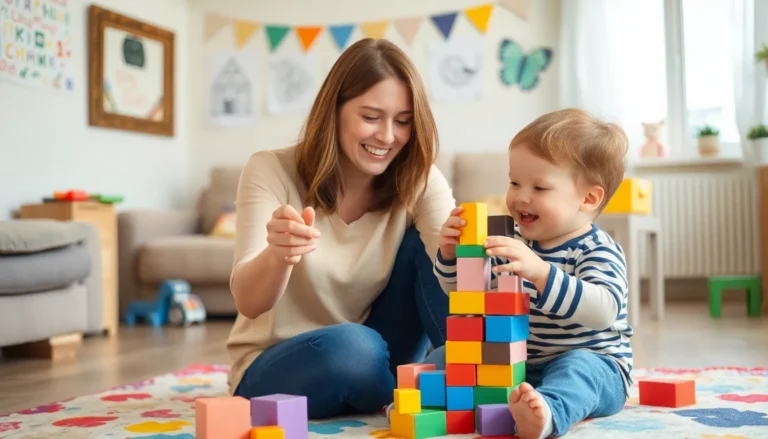Table of Contents
ToggleNavigating the world can feel like a minefield for sensitive children. One moment they’re giggling over a silly joke, and the next, they’re overwhelmed by the sound of a vacuum cleaner. It’s not just their imagination; they experience emotions and stimuli in a way that can leave even the most seasoned parents scratching their heads. But fear not! There are effective approaches that can transform these challenges into opportunities for growth.
Understanding Sensitive Children
Sensitive children experience the world differently due to their heightened emotional and sensory perceptions. This uniqueness gives them distinct characteristics and challenges.
Characteristics of Sensitive Children
Sensitive children often display strong reactions to their surroundings. They might notice subtle changes in environment, such as sounds, lights, or textures that others overlook. Empathy frequently marks their interactions, as they easily connect with others’ emotions. These children show deep thinking and intense creativity, often expressing themselves through art or imaginative play. Additionally, they may need more downtime to recharge after social activities, as overstimulation can lead to heightened anxiety.
Common Challenges Faced
Sensitive children encounter various difficulties in daily life. Social interactions can overwhelm them due to their heightened sensitivity to others’ feelings and social cues. They may struggle with anxiety, especially in unpredictable or loud environments, leading to avoidance behaviors. Transitions can pose additional stress, as adjustments to changes in routine or expectations often trigger discomfort. Furthermore, their intense emotional responses can result in misunderstandings with peers, complicating friendships and social development.
Parenting Approaches for Sensitive Children

Parents can effectively support their sensitive children through tailored approaches that acknowledge their unique needs. Fostering a nurturing atmosphere plays a crucial role in their development.
Creating a Nurturing Environment
Establishing a calm and safe space helps sensitive children manage emotions. Soft lighting and soothing colors can reduce overstimulation. Including cozy areas for quiet time encourages recharging. Consistency in routines provides comfort, allowing them to anticipate daily events. Parents might consider using sensory tools, like fidget toys or textured items, that promote relaxation. Keeping environments predictable can ease anxiety, especially during transitions that might otherwise overwhelm them.
Encouraging Open Communication
Facilitating open dialogue ensures sensitive children feel heard and understood. Parents should ask open-ended questions about their feelings, allowing them to express emotions without judgment. Using age-appropriate language fosters understanding, enhancing connection. Regular check-ins can help parents gauge their child’s emotional state. Creating a routine for sharing thoughts at specific times builds trust and security. Modeling vulnerability teaches sensitive children that it’s okay to express emotions openly.
Educational Strategies for Sensitive Children
Educational strategies play a crucial role in fostering the development of sensitive children. Tailoring approaches to their unique needs supports their growth and well-being.
Individualized Learning Plans
Individualized learning plans provide customized educational experiences for sensitive children. These plans assess strengths and challenges, allowing for targeted instruction. Emphasizing emotional and sensory needs helps create an optimal learning environment. Adjustments such as flexible pacing and differentiated activities engage sensitive learners. Regularly reviewing progress ensures alignment with evolving needs.
Classroom Accommodations
Classroom accommodations offer essential support for sensitive children. Designated quiet zones allow for breaks, reducing sensory overload. Teachers can incorporate visual schedules to enhance predictability, easing anxiety. Flexible seating options promote comfort and focus, allowing students to engage effectively. Encouraging collaborative learning fosters social skills while respecting individual sensitivities. Implementing structured routines provides stability, helping sensitive children thrive in school settings.
Therapeutic Methods for Sensitive Children
Several therapeutic methods effectively support sensitive children. These approaches focus on addressing their unique emotional and sensory needs, fostering resilience and personal growth.
Play Therapy Techniques
Play therapy techniques engage sensitive children in a way that feels natural and enjoyable. Using toys and games, therapists create a safe space for children to express feelings. Children can explore emotions through imaginative play, making difficult experiences easier to process. Techniques such as role-playing or storytelling encourage self-expression. Through these methods, children can build coping skills and develop emotional regulation. Observing children’s interactions during play offers valuable insights into their inner worlds. This information helps therapists tailor further interventions.
Mindfulness and Relaxation Strategies
Mindfulness and relaxation strategies serve to calm sensitive children and enhance emotional awareness. Activities like deep breathing, guided imagery, and gentle stretches promote relaxation. These techniques provide children with tools to manage anxiety and overstimulation effectively. Regular practice fosters a sense of security, helping children feel more centered. Incorporating mindfulness into daily routines can create a peaceful environment for sensitive children. Techniques such as mindfulness meditation can be done together with parents, strengthening the bond while nurturing emotional resilience. Overall, these strategies empower children to navigate their emotional landscapes with greater ease.
Community Support for Sensitive Children
Support networks play a vital role in nurturing sensitive children. Various resources exist for parents to better understand and assist their children’s unique needs.
Resources for Parents
Books, articles, and online forums provide valuable insights into the world of sensitive children. Organizations like the Highly Sensitive Person (HSP) website offer extensive literature specifically targeting sensitive traits. Workshops and webinars present opportunities for parents to learn coping strategies directly from professionals. Engaging with other parents through blogs or social media groups encourages sharing experiences and advice, strengthening community bonds. Local libraries often host parenting seminars focused on emotional intelligence and sensory processing. Utilizing these resources equips parents with the knowledge necessary to foster resilience and emotional growth in their children.
Support Groups and Networks
Support groups benefit both sensitive children and their parents. Local community centers commonly offer gatherings where parents can discuss challenges and celebrate successes. Connecting with others in similar situations fosters a sense of belonging and understanding. Online platforms like Facebook groups or dedicated forums allow for flexible participation, enabling parents to seek advice anytime. Professional-led support groups often focus on specific strategies, enabling parents to gain insights from specialists. Active participation in these networks enhances both emotional support and practical guidance, empowering parents to navigate their children’s unique sensitivities effectively.
Supporting sensitive children requires understanding and tailored approaches that honor their unique experiences. By creating a nurturing environment and encouraging open communication, parents can help these children thrive emotionally and socially. Educational strategies that focus on individualized learning and classroom accommodations play a crucial role in fostering resilience.
Incorporating therapeutic methods like play therapy and mindfulness techniques further empowers sensitive children to navigate their feelings and develop coping skills. Engaging with community resources and connecting with other parents enhances support networks, providing valuable insights and shared experiences. Embracing these strategies can turn the challenges of sensitivity into opportunities for growth and deeper connections.







